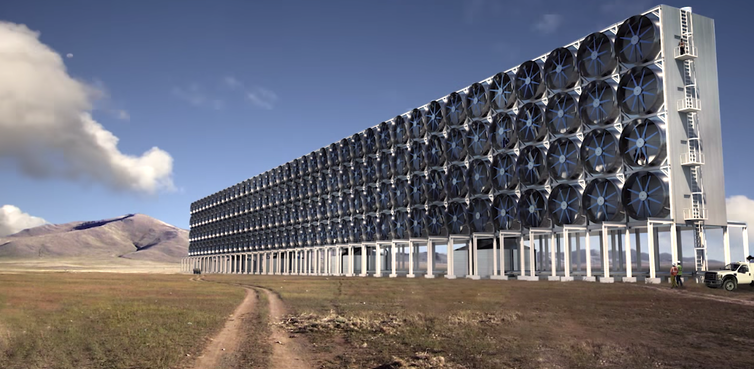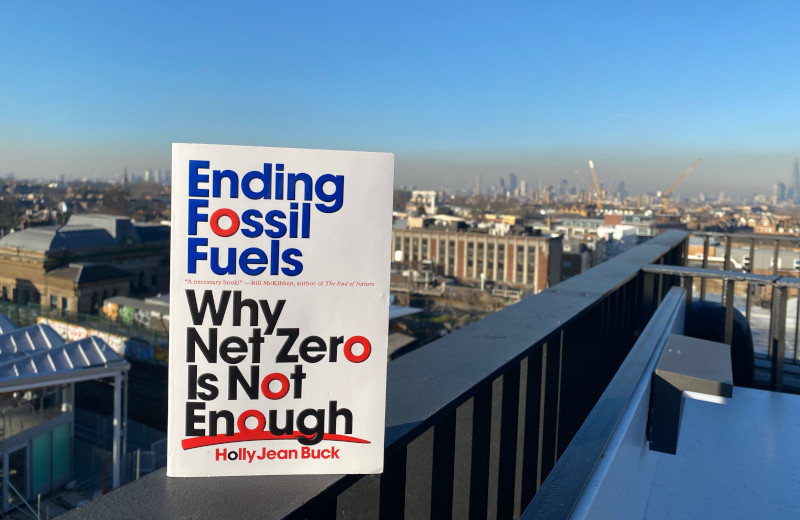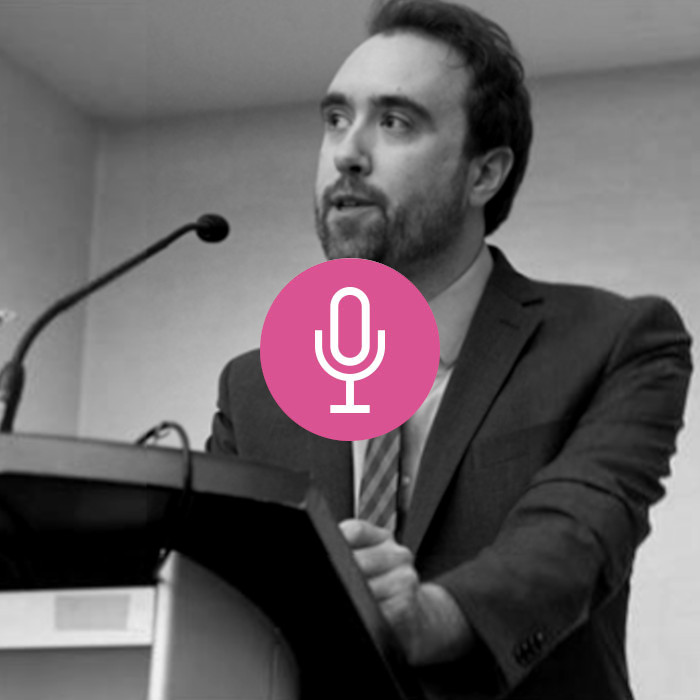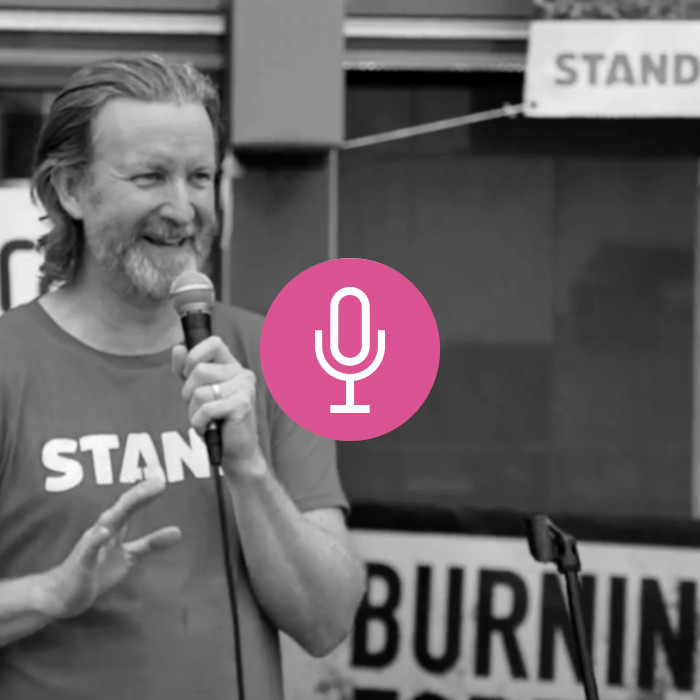Table of Contents
“Net zero is both tedious and a hot trend”, says Professor Holly Jean Buck in Ending Fossil Fuels: Why Net Zero is Not Enough.
Coming from anticapitalist publisher Verso, with chapter titles like “The Cruel Optimism of ‘Net Zero’” and “A Phaseout Toolbox for the 2020s”, I began this book expecting it to be a passionate manifesto that definitively makes the case for a ‘true zero’ climate strategy.
It is not; Buck’s book is more nuanced than this, but more flawed. It makes strong arguments for a fossil fuel phaseout. Perversely, it also supports contentious narratives around continuing fossil fuel use and techno-saviourism – the very narratives promoted by net zero framing. It is a work of contradictions.
What is net zero, and what is wrong with it?
Net zero is an approach to climate planning framed through accounting. Recognising that carbon dioxide emissions are causing a planetary crisis, the net zero framework aims for a future where we remove as much CO2 from the atmosphere as we emit, through nature and new technologies. In this future, humans’ net carbon emissions are zero, even though we are still emitting CO2 at a large scale.
It is a relatively new concept. According to Buck, the net zero approach was formed on a Scottish country estate in 2013 by a network of climate lawyers and policymakers. Two years later, it was institutionalised globally through the Paris Agreement. Today, national and local governments, businesses, and institutions around the world are setting target dates to reach net zero.
For policymakers, it sounds easier to invest in trees and new tech than to plan a complete, rapid, transformation of the planet’s human infrastructure, material economies, and sources of energy and power. But net zero is no get out clause to avoid sweeping, detailed policy: quite the opposite. It requires an enormous, unprecedented level of monitoring and research to estimate and track the CO2 emissions for everything. Buck asks: “I mean, how does anyone know when net zero happens? It’s not like alarm bells go off.”
Buck links this growing relationship between climate mitigation and technocratic carbon accounting to the net zero approach, and criticises it for uninspiring messaging, elitism, and risk. Net zero is both tedious and a hot trend.
It is also a serious concern. Academics and activists are increasingly warning that net zero thinking “helps perpetuate a belief in technological salvation and diminishes the sense of urgency surrounding the need to curb emissions”. Whether we can deploy carbon removal technologies at large scale is still effectively unknown, and it definitely will not be easy.
Currently-implemented examples of net zero thinking have potentially done more harm than good, such as carbon offsets creating a surge of corporate greenwashing, or bioenergy causing mass deforestation. Net zero has also encouraged the rise of supposedly carbon-neutral fossil fuels, a concept that has been described as “pipe dreams and marketing gimmicks” by climate campaigners. A 2020 study in Climatic Change even demonstrated that net zero strategies focused on greenhouse gas removal could lead to an extra 1.4 degrees of global heating.
Democratised planning, but not different planning
Buck sees net zero as leading to a dystopian future where the need for exhaustive monitoring has spread surveillance capitalism beyond harvesting human social data, to the natural world too: “Imagine a network of satellites and sensors feeding data to platforms 24/7, optimizing each square meter of land to sequester carbon.”
Sounds scary. Yet Buck says this “could be great”, if it were not for the context of a corporate offsets market. A contention between criticism of the growing, professionalised industry of climate data, and then advocating that we need more data and planning, runs throughout the book.
Buck discusses how corporations have created systemic problems that have led to the climate crisis, and how technocratic ‘NGOisation’ has created systemic problems within climate work, but never really imagines alternatives. Instead, she makes passing suggestions around democratisation and increased public ownership of these same industries and methods, nodding to leading authors such as Yuval Noel Harari, Zephyr Teachout, and Daniel Yergin as she does so.
To be clear here: I am not criticising arguments for making climate mitigation more transparent, democratic and publicly controlled, nor objecting to Buck’s critiques of net zero. Ending Fossil Fuels is written for climate professionals, and is critical of climate professionals. As a recent member of ‘The Green Blob’ in the UK, I take no issue with this.
Rather, as someone within the sphere she’s criticising, I had hoped Buck would go further in reimagining the approaches to climate mitigation that big corporations and climate professionals have normalised. In her chapter on code, for example, Buck addresses Microsoft’s plan for an ‘AI for Earth’ and a ‘Planetary Computer’. Discussing it in the context of Shoshana Zuboff’s theory of instrumentarianism – how corporations use algorithms and surveillance to shape human behaviour for profit – Buck warns that these technologies could be abused by Microsoft to shape the natural world for profit too.

A radical, truly anti-corporate argument against net zero would present less need for a planetary computer: many of its functions relate to carbon markets and carbon capture and storage (CCS) tech. It is hard to imagine any planetary computer that is not at least controlled by superpower nations. Yet despite multiple pages devoted to its dangers and a stated desire to reimagine climate planning with less data and technocracy, Buck cannot envision an alternative; “Instead of rejecting planetary-scale computation and ecological sensing, we need to bring them under public control and direct them to public aims,” she says, although how to do this is not fleshed out.
Her argument may still be right in this case: current climate policy modelling is flawed [1], and artificial intelligence could provide a solution. But it isn’t necessary to stop extracting fossil fuels, and AI is hardly at the stage where we can easily imagine it being created without harmful biases or corporate influence. Academics have also long warned of how energy intensive AI is.
This exemplifies the rhetoric of compromise that runs throughout the book. Whether it is CCS, bioenergy, carbon markets, or ‘low carbon’ fossil fuels, Buck takes a more moderate and more vague view than most activists, and indeed than many of the climate professionals she criticises.
This is at odds with the scrutiny she gives to less controversial areas of climate mitigation. There are multiple points in the book devoted to apprehension around the future of wind turbines, focusing on their spatial and material requirements, and concerns around public acceptance. Fair enough: these are important topics to consider. But these and similar issues were not discussed in relation to bioenergy, or CCS, which Buck advocates.
Modelling that relies on bioenergy with CCS requires land use twice the size of India, and bioenergy increases emissions in the short term. Direct air capture plants themselves have huge spatial and material requirements, and many will require a whole new wind farm to power themselves anyway. There is far more concern around the social licence for geological carbon dioxide storage, which is already an unpopular option and could cause earthquakes [2], than there is with wind farms. Scrutinising the best existing technologies while giving more controversial ideas an easy ride distorts the bigger picture.
'Flexibility’ can no longer be our priority
Buck is at her best when analysing cultural ideas around oil, planning, and ending things, and weakest when proposing future strategy. There are sections of real use to campaigners, such as a series of reasons – other than global heating – that the world would be better without fossil fuel companies. These discuss public health, environmental justice, suffocating innovation in other fields, and reducing high level corruption.
Ultimately, it feels as though Buck wanted to write a book about the issues with current climate mitigation efforts, and the complexity of the problems ahead, not a book about ending fossil fuels or criticising net zero. When I interviewed her in December, she was unwilling to even take a hard stance against net zero: “I know a lot of comrades in the climate movement would say, you know, net zero is a total scam, forget net zero. The thing about net zero is it allows this sort of flexibility.” She then went on to discuss advanced oil recovery creating carbon negative oil, a widely criticised idea which Professor Duncan McLaren warned the British parliament to be sceptical of only this month.
Ending Fossil Fuels provides useful food-for-thought for people working in the climate sector, especially for those in the US. But for alternatives to net zero, I would refer to the many existing campaigns and reports around true, real, or absolute zero, some of which are linked below. To build a movement that challenges the net zero framework, there needs to be a narrative that really questions how net zero, and the issues around it, have seeped into all other areas of climate work. Otherwise net zero scepticism will be written off as nothing more than a tedious hot trend.
Endnotes
Further reading
- Net-zero pipe dreams: Why fossil fuels cannot be carbon neutral: an October 2021 report from Carbon Market Watch. Read here.
- ‘Climate scientists: concept of net zero is a dangerous trap’, in The Conversation, April 2021. Read here.
- NOT ZERO: How ‘net zero’ targets disguise climate inaction: a 2020 briefing by a network of climate justice organisations. Read here.
- Duncan McLaren’s 2020 paper in Climatic Change that warns of a focus on GGR leading to “an additional temperature rise of up to 1.4 °C”. Read here.
- UK FIRES’ 2019 report, Absolute Zero. Read here.
Bertie Harrison-Broninski is an Assistant Editor at Land and Climate Review. He also works freelance as an investigative journalist, edits several non-profit publications, and hosts The Climate Show for thepostman24. You can find him on twitter @bertrandhb.
Listen to our podcast with Holly Jean Buck:
- Podcast




